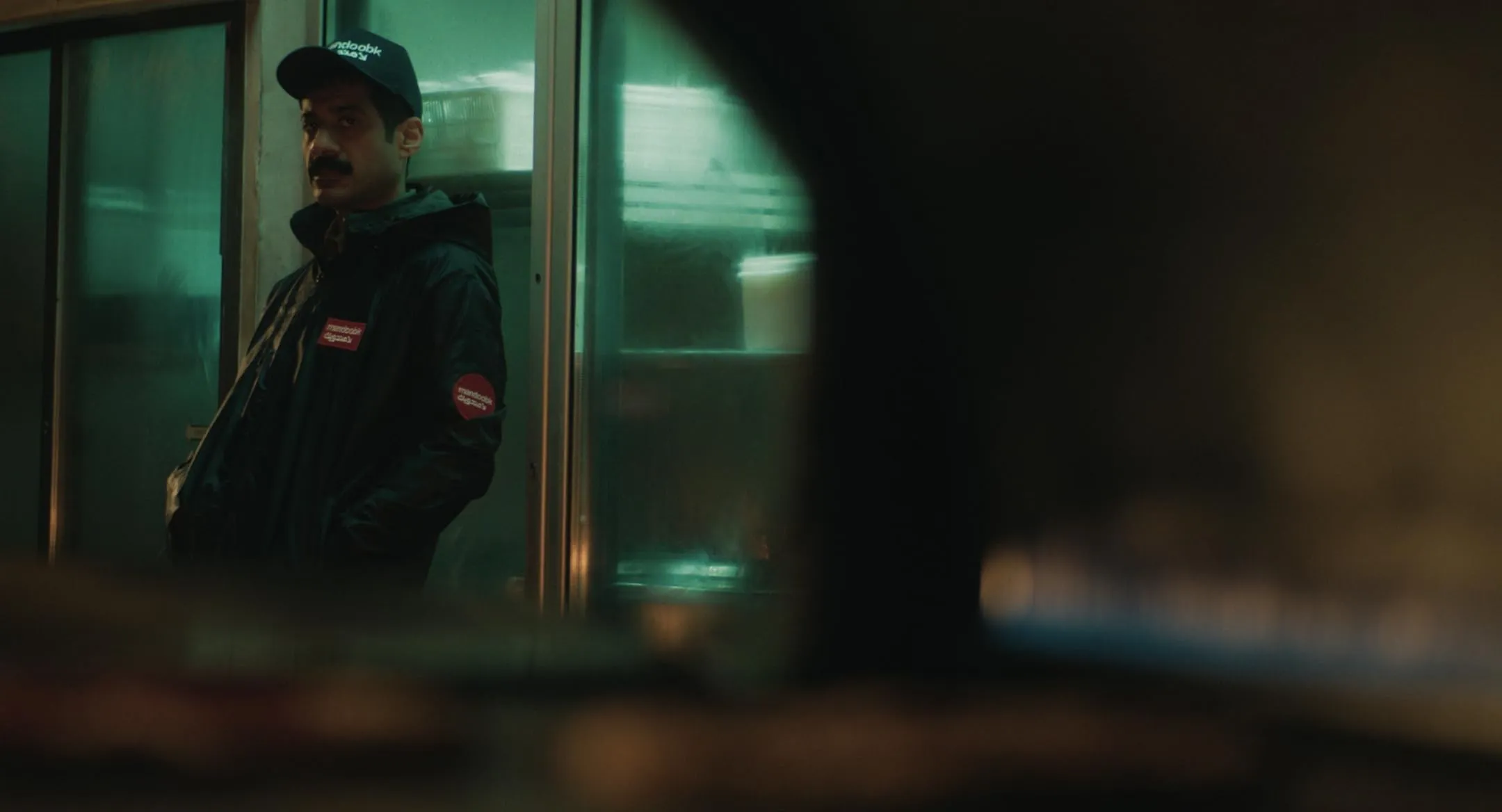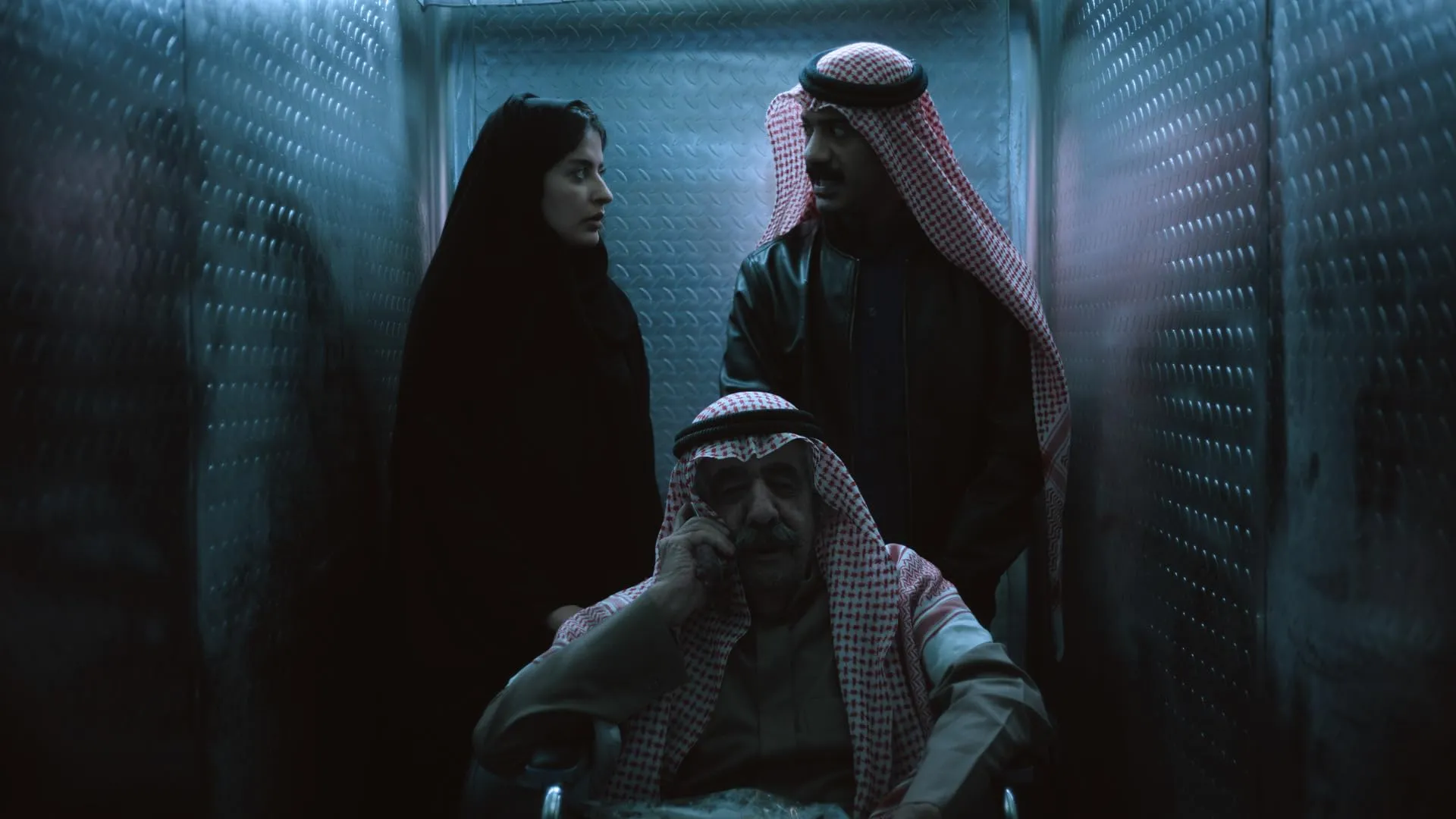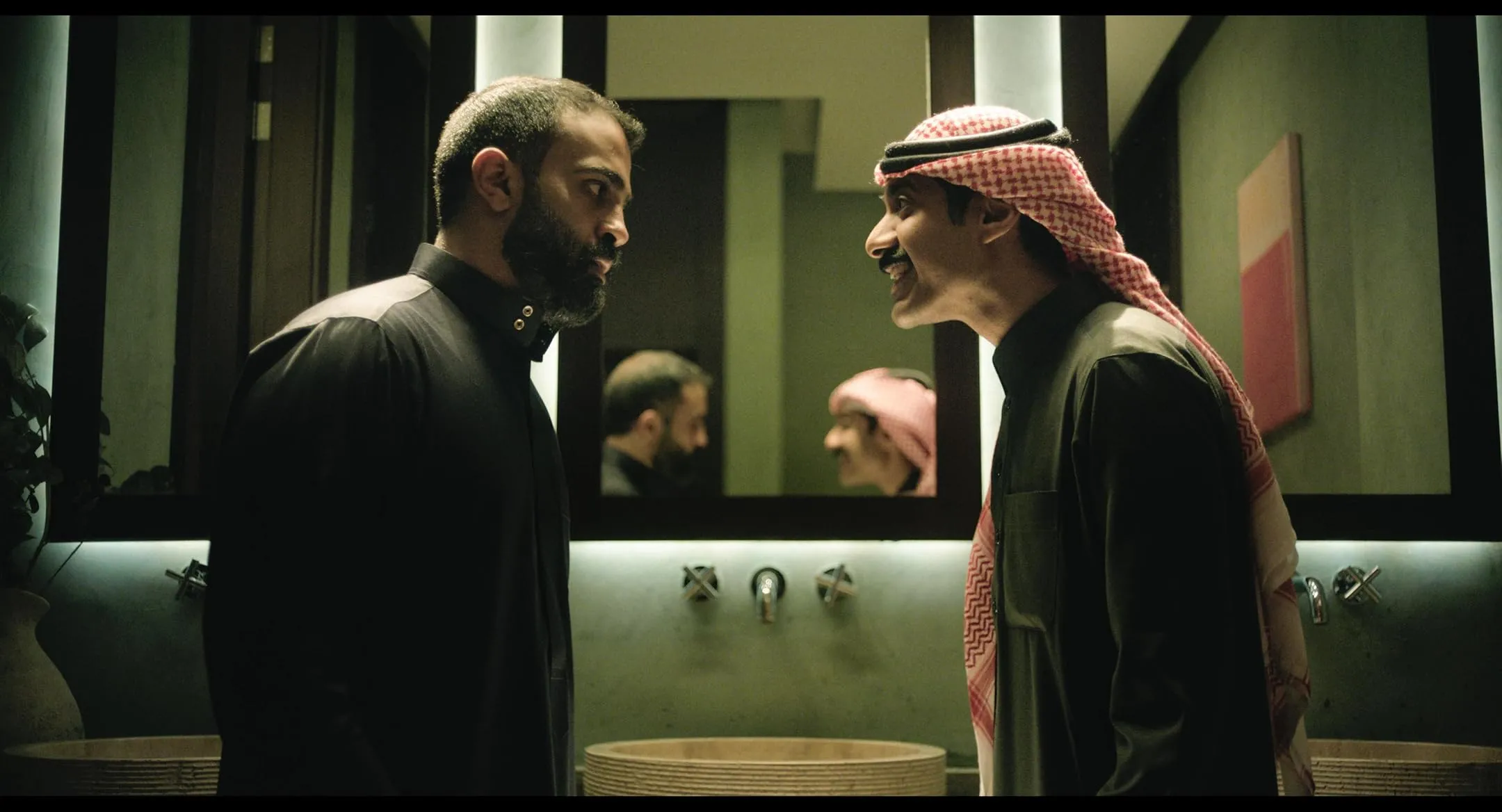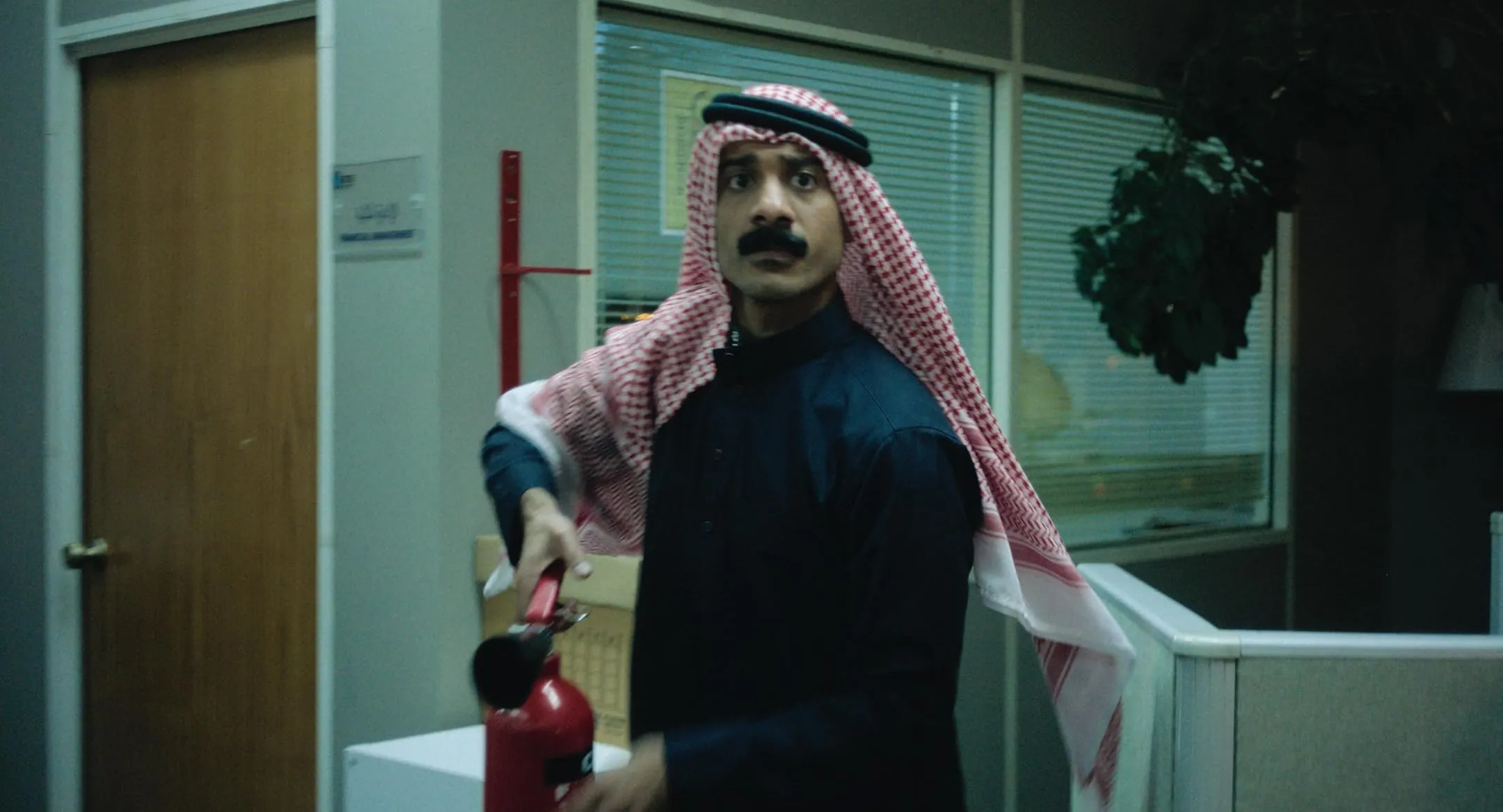Ali Kalthami’s Night Courier ushers in a new era of Saudi filmmaking. Released in 2022, the movie tells the story of Fahad, a food delivery driver struggling to make ends meet in modernizing Riyadh. Kalthami deftly uses Fahad’s plight to probe complex issues within Saudi society, from rigid class divisions to economic uncertainty.
Night Courier also introduces audiences to rising star Mohammed Aldokhei. His nuanced turn as Fahad anchors the movie, bringing to life a man whose desperation stems from compassion for loved ones rather than malice. When Fahad turns to bootlegging liquor for cash, it’s not greed that drives him, but the need to care for his ailing father. Aldokhei imbues Fahad with an earnest vulnerability that makes his missteps feel both sad and true to life.
Shot entirely within Riyadh’s glittering skyscrapers and darkened alleys, Night Courier paints a vivid portrait of a city in transition. As skytrains and luxury apartments symbolize new fiscal heights, poorer Saudis like Fahad struggle with stagnant prospects down below. Their world remains one of paycheck-to-paycheck living exacerbated by sudden medical costs. It’s a societal dichotomy that Kalthami deftly illustrates through Fahad’s increasingly dire circumstances.
While not without flaws, Night Courier stands out as a promising debut that transcends national borders. Kalthami proves himself a director in step with influential neo-noir films. But more than mimicking past masters, his movie crafts a resonant story that could only emerge from Saudi culture at this moment in its history.
Fahad’s Struggles Come to Life
Mohammed Aldokhei brings Fahad’s character vibrantly to the screen. From the start, his natural charisma draws you to this flawed man, ensuring his struggles resonate. Aldokhei perfectly captures the little joys that keep Fahad hopeful amid life’s challenges. Whether smiling at a kind word or dancing joyfully alone, these glimpses of happiness are tragic in their brevity.
For Fahad faces immense pressures. As the sole provider for his ailing father, finances are a constant crisis. The desperation of feeding another mouth while your own prospects stagnate is a universal plight, yet Aldokhei makes it piercingly real. He conveys every nerve of frustration at a system leaving skilled men in dead-end jobs with dwindling relief. When rash decisions stem from this stress, viewers understand, even if we wish Fahad wiser choices.
Subtler still is Fahad’s longing to prove usefulness, seen in his rush to “help” loved ones who need no saving. Aldokhei taps sorrow in these missteps, revealing the isolation beneath bravado. Only in private moments does the acting strip back pride to bare vulnerability. One watches rapt, feeling for a man whose flaws remain very human. It’s a testament to Aldokhei’s gift that even when Fahad disappears into delusion, we stay hopeful he might find clarity.
Through this profound lead performance, Ali Kalthami’s film brings urgently to light social issues facing Saudis. For while new opportunities emerge, not all prosperity reaches those currently struggling. The living contrast between haves and have-nots remains stark. With compassion, Mandoob spotlights those whom progressive reforms do not immediately aid, ensuring their reality remains seen and understood. It’s a story that could unfold anywhere, made piercing through Aldokhei’s ability to breathe heartbreaking life into its hero.
Capturing unease beneath the lights
Ali Kalthami makes deft use of stylistic noir elements to unsettle. From the opening scenes, Riyadh is draped in an unnatural gloom by Ahmed Tahoun’s camera. Streetlights and neon glow an eerie blue, leeching warmth from crowded streets and empty alleys alike. It’s a world apart from daytime photos of sparkling towers and lavish shopping domains.
This disorienting shroud intensifies the drama unfolding within. As Fahad slides deeper into trouble, shadows seem to lengthen at his heels. Loose ends in the plot are forgiven due to mounting paranoia—what fresh horrors lurk around each dimly lit corner? Kalthami keeps viewers as off-kilter as his tragic hero. It’s a testament to his nuanced direction that unease feels appropriate rather than exploitatively strange.
Fakhreddine Amri’s editing contributes stealthily to the mood. Transitions slice fluidly from one unsettled scene to the next. Moments linger to let anxiety fester before releasing into frenetic motion. Key shots repeat from changing angles, amplifying Fahad’s spiral into confusion and doubt. Early flourishes of black humor turn into something darker too, reflecting his cracking mindset.
Together, Kalthami and his talented collaborators capture unease beneath bright Saudi modernity. Their neo-noir sheen shines disturbing light on how easily opportunity’s façade may shatter for those left behind. Even Riyadh’s most luxe enclaves hold unknown terrors in the deep of night, when all hope seems lost to fortune’s cruel contrivances.
Living in the Shadows of Luxury
Ali Kalthami’s debut shines light on lives obscured by Riyadh’s glitter. Through Fahad’s desperate circumstances, he spots societal divisions widening as new money elevates certain Saudis’ standard of living.
We see men like Fahad struggling in low-wage gig work—one mishap from ruin. His reduced means contrast starkly with the opulence flaunted by customers. Their penthouses and five-star restaurant bookings seem a world apart from Fahad’s cramped home and meager earning.
This class divide leaves question marks over reform promises. While development enriches the fortunate, what of those left in the lurch of outdated systems? Fahad’s abilities remain underused, resignation his sole recourse from stresses not entirely of his making.
Kalthami captures potential problems presaged by uneven progress. Social mobility proves more complex when poverty persists quietly amid wealth’s dazzle. Though censorship forbids overt critique, his commentary comes across compassionately.
Mandoob also stands as a landmark in shifting perspectives. Bringing challenges facing Saudis to the mainstream, it affords deeper understanding of a nation modernizing at its own pace. Local support signals cinema’s growing role in expressing realities long blurred by stereotypes.
In spotlighting those exiting poverty’s shadows alone, Kalthami’s film becomes a hopeful sign that more Saudi stories may soon reach willing ears worldwide. Its humanity reminds us that lives in every land deserve recognition, not reduction to abstraction.
Neighbors Both Familiar and Strange
Fahad’s world brings Riyadh’s diversity to light. His sister Sara juggles tradition gracefully as her cookie venture modernizes family recipes. Yet social ties provide bittersweet relief for Fahad alone amid modernity’s spread.
Maha too balances old and new. Her workplace French embraces a cosmopolitan air, yet dining out remains work activity rather than pleasure. Class differences shine through casually, like strangers sharing streets yet living worlds apart.
Ali captures such contrasts through evocative scenes. Luminescent towers loom over backstreet haunts as Fahad nervously maneuvers. At underground raves, pulsing rhythm and glowing youth smash taboos—freedoms Fahad can admire yet never grasp. Ever an outsider within his own city, neighbors seem neighbors in name alone.
Yet humanity connects these vivid strangers. Sara never abandons familial duty, while Maha’s kindness, though laced with distance, recalls our shared capacity for empathy. Even transition’s isolates remain tethered by threads of care, however frayed, reminding us that community outlives the most disparate lifestyles between neighbors, both familiar and strange.
Borrowing from Masters While Finding Its Own Voice
Ali Kalthami wears his influences proudly without pastiche. Night Courier shares DNA with neo-noirs like Scarlet Street yet speaks in its own emotional language.
At times Kalthami strains under debut ambitions. Uneven pacing slackens some suspense sequences just when intrigue peaks. Predictability robs later shocks of punch earned earlier.
But critiques feel trifling given Kalthami’s skill elsewhere. The underground party scene sears with symbolic anguish—a doomed Fahad forever an outsider within Riyadh’s new diversity.
His pathetic dinner with Maha echoes Kitty’s dismissal of Edward G. Robinson in Scarlet Street through subtle gestures. Facial flashes flay fantasies as reality dawns with quiet despair.
Kalthami proves a master of visual storytelling. One recalls Jacques Tati elevating mundanity into laughing philosophy. Here mundanity mocks a man’s broken dreams, instilling pathos with scarcely a word.
In focusing on Fahad’s humanity over thriller machinations, Kalthami gifts a profound character study. Comparisons sharpen analysis without outshining his distinct gifts.
While imperfect, Night Courier rises from formula on compassion’s wings. In spotlighting souls global cinema often overlooks, Kalthami makes an auspicious entry, maybe outstripping genre masters on empathy alone.
A Seed That Will Surely Sprout
So in conclusion, Night Courier proves itself a compelling film despite flaws inherent to an emerging national cinema. Ali Kalthami establishes himself as a director of nuance, investing heartfelt empathy into every frame through Fahad’s tragic journey.
Mohammed Aldokhei, too, emerges as someone to watch. His raw abilities anchor and transcend the story, bringing life and humanity to a man viewers will not soon forget. Such performances are why cinematic dreams take flight.
While uneven, Night Courier’s strengths far outweigh brief missteps. Its compassion resonates long after the final frames fade, reminding us that shared humanity exists beyond any border. For a first feature, Kalthami’s progress feels assured—this seed will surely sprout given support now growing.
Saudi film has shown its willingness to grapple with difficult issues constructively. In spotlighting human faces too often reduced, Night Courier suggests a bright future if independent voices remain unfettered. Its appeal hints that global cinema may now see the kingdom and tales it has to share in a light both true and kind.
The Review
Night Courier
Night Courier shows promise as a debut that transcends technical flaws through emotionally compelling character work. Kalthami proves himself a director to watch as his heartfelt portrayal of Fahad resonates long after the end credits roll. Bolstered by Aldokhei's breathtaking lead performance, the film remains an impactful glimpse into contemporary Saudi society. While uneven in parts, Night Courier gets closer to the human condition than many more polished thrillers, making its themes of loneliness and struggle feel universal.
PROS
- A compelling lead performance by Aldokhei anchors the film.
- Evocative and impactful character study of Fahad
- Sheds light on socioeconomic issues in Saudi Arabia
- Brings nuanced perspectives to international audiences
CONS
- Uneven pacing that weakens some suspenseful scenes
- The plot is a bit predictable at times
- First feature shows signs of inexperience






















































Discussion about this post